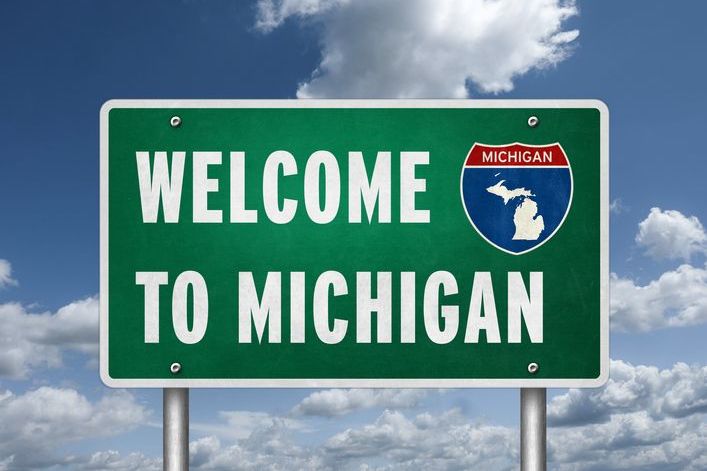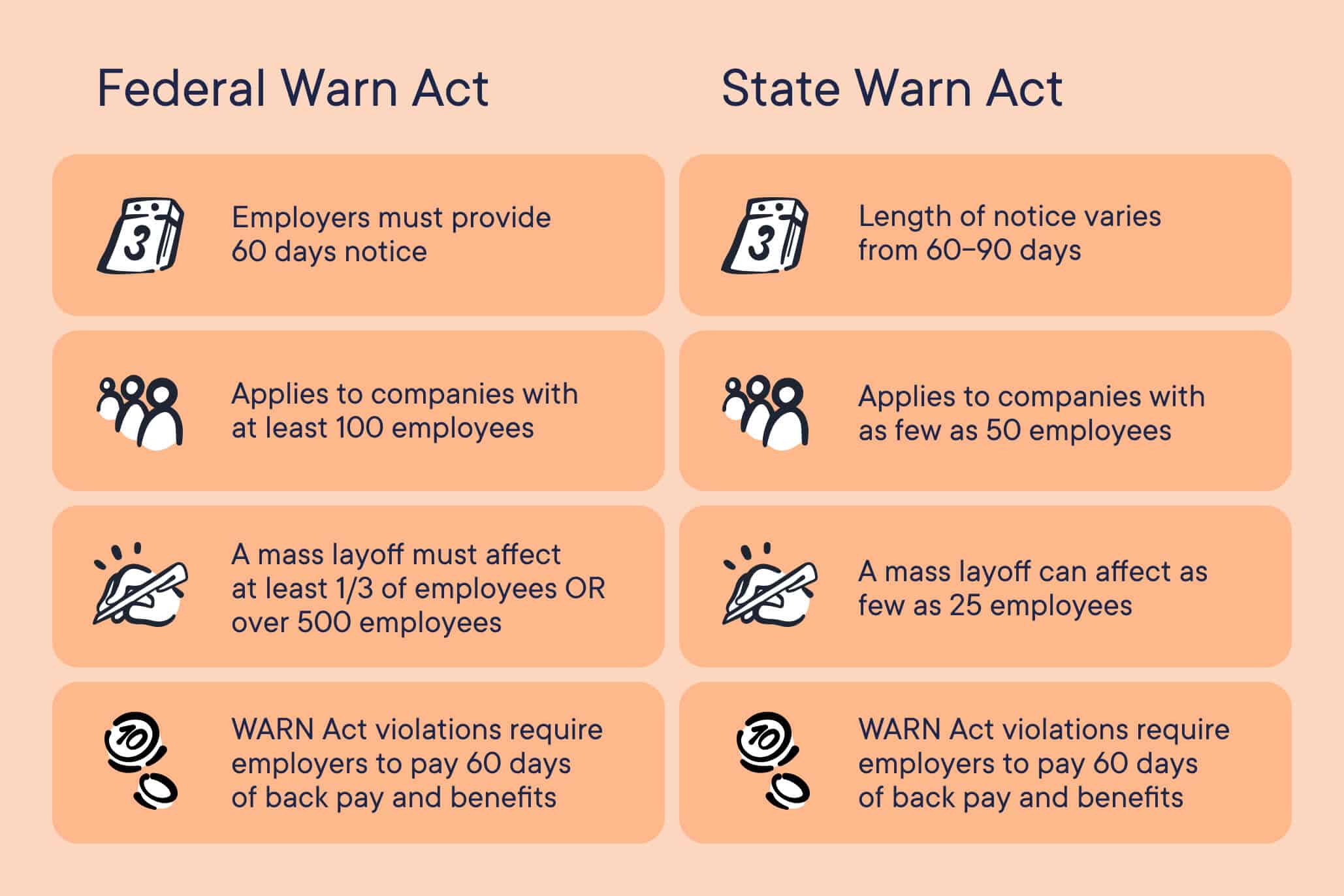
WARN Act Michigan 2025: Requirements, Coverage, and Compliance
January 20, 2025 Written by Cynthia Orduña

Preparing for a RIF?
Download our Essential Guide to Handling a Layoff
Request Pricing
Compare our rates to other providers
If you are planning to lay off employees in the state of Michigan, you will need to make sure that you comply with all regulations pertaining to the Worker Adjustment and Retraining Notification Act (commonly known as the WARN Act). This will ensure that your employees are treated fairly and that you are not penalized for your layoff or reduction in force (RIF) event.
To make sure that you are compliant with the WARN Act in Michigan, you will need to understand three different areas of these laws:
- The federal WARN Act requirements
- The state-specific WARN Act Michigan requirements
- How to comply with the WARN Act in Michigan
Before we get into our analysis for each of these areas, make sure to download our simple WARN Act checklist with the link below:

Does Michigan Have a WARN Act?
Michigan, like many other states, does not have a state-specific WARN Act. However, this doesn’t mean workers in Michigan are unprotected. The federal WARN Act applies to Michigan employers, requiring them to provide advance notice of mass layoffs and plant closures, including details on the number of affected employees.
While Michigan and states like Ohio, Georgia, and Florida are governed solely by the federal WARN Act, other states—such as California, New York, New Jersey, and Illinois—have their own state-level WARN Acts with additional requirements.
WARN Act Michigan Qualifications
The purpose of the WARN Act is to give employees enough time to prepare for big changes in the workplace. Even if a company isn’t required to provide WARN notices, Michigan encourages all employers to do so as a best practice.
Here’s how to know if your organization qualifies for the WARN Act in Michigan:
Applicability of the WARN Act in Michigan
- Applies to employers with 100 or more full-time employees.
- Applies to publicly and privately held companies.
- Applies to organizations that are for-profit or not-for-profit.
- Excludes workers who:
- Have been employed for less than six months in the past year.
- Work fewer than 20 hours per week.
WARN Act Notification Requirements
- Employers must give advance notice of any plant closing or mass layoff.
- Affected employees include:
- Hourly workers.
- Salaried staff.
- Managers and supervisors.
- Business partners are not required to be notified.
If your organization has fewer than 100 full-time employees (FTEs), you are not required to comply with the WARN Act. However, if your company has more than 100 full-time employees, the WARN Act applies to you, regardless of whether you are a public or private entity, for-profit or nonprofit.
To understand this WARN notice requirement, let’s look more closely at what constitutes a “mass layoff” or “plant closing” according to their federal definitions:
The federal WARN Act states that a “mass layoff” happens when a series of layoffs over a 30-day period results in the loss of 500 or more employees. Additionally, if fewer than 500 employees are laid off but it amounts to at least one-third of the workforce over the same 30-day period, a WARN notice must be provided..
According to the US Department of Labor (DOL), a “plant closing” occurs when one or more facilities or operating units at a specific location anticipate a shutdown that will affect more than 50 workers and last for more than 30 days.
WARN Act Michigan Examples
To clarify this further, here are a couple of examples of situations in which the WARN Act might apply in Michigan.
- A manufacturing company in Detroit, Michigan has 75 employees. The organization plans to lay off more than half of its workforce due to the loss of a business contract.
Since the company has fewer than 100 employees, it is not required to provide a WARN notice.
- A nonprofit organization with over 500 employees is closing an office in Lansing, which will result in 134 employees being permanently laid off.
Since the organization has more than 100 employees and the office closure will affect more than 50 workers for more than 30 days, a WARN notice is required.
- A retail chain in Kalamazoo, Michigan, with 150 employees across multiple locations, decides to close one of its stores. The closure will result in 55 employees losing their jobs permanently.
Since the company has more than 100 employees, and the closure will affect more than 50 employees for over 30 days, the WARN notice is required.
How to Comply with the WARN Act in Michigan
To ensure you fully comply with the WARN Act in Michigan, you must notify affected employees at least 60 days before their last day with the organization. The notice must be provided in writing and can be delivered through various methods, as long as it is reasonable.
However, the US DOL clarifies that pre-printed notices regularly included with employees’ paychecks or pay envelopes are not sufficient and do not meet WARN Act requirements. This means that if your organization typically includes notices with paychecks, providing a WARN notice in this way is not acceptable. Employees might overlook it since they receive other notices regularly through the same method.
When preparing your WARN notice for employees, be sure to include the following details:
- A clear notification of the upcoming reduction in force.
- Information on whether the layoff is permanent or if employees might be called back to work.
- A timeframe of when the layoffs will occur and when their positions will be affected.
- Your organization’s policy on bumping rights (if applicable).
- Information about severance benefits that will be provided to the affected employees.
- Contact information for a designated representative (typically from HR) for employees to reach out to for further information.
In addition to notifying employees, your organization is also required to notify government entities about the reduction event. Similar to the employee notice, this must be done at least 60 days in advance. According to the US Department of Labor, “Advance notice should be given to the State Rapid Response Dislocated Worker Unit as well as to the chief elected official of the local government where the closing or mass layoff is to occur.”
Other State Laws Impacting Your Layoffs
Michigan does not have specific state laws governing layoffs, aside from the federal requirements outlined in the WARN Act. This means that if your organization is located in Michigan and all employees being laid off are also in Michigan, you are only required to comply with the federal WARN Act.
However, if your organization employs workers in multiple states, it’s important to consider the laws of each state where you have employees. Even if most of your staff or your headquarters are based in Michigan, you may need to follow different state regulations when laying off employees in other locations.
In these situations, it’s advisable to identify the most stringent state law among all of the locations where layoffs will occur and apply those regulations consistently for all of your affected employees.
Where to Find Information on Michigan Layoffs
If you’re trying to stay informed about which companies in Michigan are conducting layoffs, especially in light of the Michigan WARN Act, there are several resources you can turn to. Given Michigan’s significant manufacturing sector, it’s important to stay updated on workforce changes in the state.
To help you track layoffs, the following resources provide up-to-date WARN notices for companies across Michigan:
- Michigan Labor Department Market Information: This site offers a comprehensive list of WARN notices issued by Michigan employers, giving you insights into businesses planning layoffs or plant closures.
- Michigan Department of Labor and Economic Opportunity WARN Notices: This Michigan.gov site also tracks WARN notices in the state, providing a detailed record of employers who have issued notifications regarding mass layoffs or plant closures.
These resources will help you stay informed about current and upcoming layoffs in Michigan, allowing you to better understand workforce trends and how they might impact you or your organization.
WARN Act Michigan: Key Takeaways
While the WARN Act may be simple enough to understand both in Michigan and at the federal level, it’s still important to stay informed on the most current regulations when your organization needs to comply.
This guide covered many of these specifics, but the law evolves constantly. So be sure to refer to the US Department of Labor and Michigan state websites for the most comprehensive and up-to-date explanation of the law.
For information on the specific WARN Act requirements in other states that may apply to your organization, especially those that may go above and beyond the federal WARN regulations, see our similar WARN Act state guides for New York, New Jersey, Illinois, and California.
It can also be extremely helpful to offer outplacement services to employees who are affected by a plant closing or mass layoff event in areas of Michigan. These services can help support their transition and provide a solution for any issues that may arise.
Be sure to consult with your legal team and company stakeholders about what solutions might be right for your organization to help you navigate the complexities of your reduction event and ensure you are following all applicable local, state, and federal laws.
In need of outplacement assistance?
At Careerminds, we care about people first. That’s why we offer personalized talent management solutions for every level at lower costs, globally.



